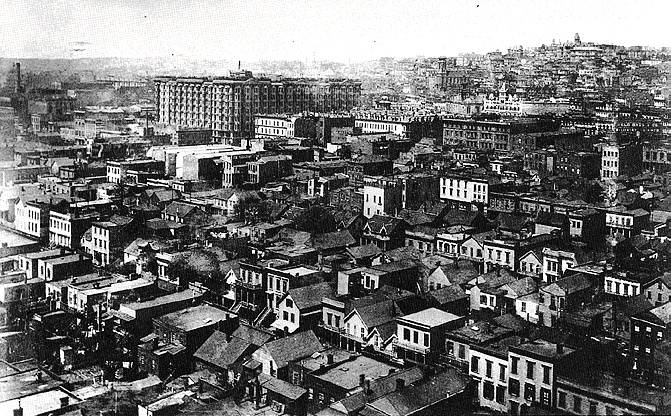Wilde & Bierce
Historical Essay
by Dr. Weirde
San Francisco Cityscape, c.1882; the Palace Hotel at Market and New Montgomery is in the center at the top.
Wilde, Bitter, & Nasty: Sharpest Pens of the 1880's Draw Blood The Palace Hotel, Spring, 1882
On March 22, 1882, Oscar Wilde arrived in San Francisco and signed into the Palace Hotel as “O. Wilde and servant.” Impeccably clothed in an outlandish array of silk and velvet, with an oversized sunflower in one hand and an ivory cane in the other, Wilde wowed just about everybody with his paen to the Beautiful. One San Franciscan, however, was not impressed. Ambrose Bierce wrote:
That sovereign of insufferables, Oscar Wilde, has ensued with his opulence of twaddle and his penury of sense. He has mounted his hind legs and blown crass vapidities through the bowel of his neck, to the capital edification of circumjacent fools and foolesses, fooling with their foolers. He has tossed off the top of his head and uttered himself in copious overflows of ghastly bosh. The ineffable dunce has nothing to say and says it with a liberal embellishment of bad delivery, embroidering it with reasonless vulgarities of attitude, gesture and attire. There was never an imposter so hateful, a blockhead so stupid, a crank so variously and offensively daft. Therefore is the she-fool enamored of the feel of his tongue in her ear to tickle her understanding.
The limpid and spiritless vacuity of this intellectual jellyfish is in ludicrous contrast with the rude but robust mental activities he came to quicken and inspire. Not only has he no thoughts, but no thinker. His lecture is mere verbal ditch-water — meaningless, trite and without coherence. It lacks even the nastiness that exalts and refines his verse. Moreover, it is obviously his own; he had not even the energy and independence to steal it. And so, with a knowledge that would equip an idiot to dispute with a cast-iron dog, an eloquence to qualify him for the duties of caller on a hog-ranch, and imagination adequate to the conception of a tomcat when fired by contemplation of a fiddle-string, this consummate and star-like youth, missing everywhere his heaven-appointed functions and offices, wanders about, posing as a statue of himself, and, like the sun-smitten image of Memnon, emitting meaningless murmurs in the blaze of women's eyes. He makes me tired.
And this gawky gowk has the divine effrontery to link his name with those of Swinburne, Rossetti and Morris—this dunghill he-hen would fly with eagles. He dares to set his tongue to the honored name of Keats. He is the leader, quoth'a, of a renaissance in art, this man who cannot draw — of a revival in letters, this man who cannot write! This littlest and looniest of a brotherhood of simpletons, whom the wicket wits of London, haling from his obscurity, have crowned and crucified as King of the Cranks, has accepted the distinction in stupid good faith and our foolish people take him at his word. Mr. Wilde is pinnacled upon a dazzling eminence, but the earth still trembles to the dull thunder of the kicks that set him up. (reprinted in Arthur Chandler's Old Tales of San Francisco)
In the same issue of Bierce's magazine The Wasp, the following limerick appeared:
There was a sweet infant named Wilde
A precious and crystaline child;
While sucking his playthings,
However he'd say things,
That proved that his mind was defiled.
It takes a defiled mind to know one, right, Ambrose? But seriously, that line about “sucking his playthings” a barely-concealed reference to Wilde's supposed predilection for fellatio -- was uncalled for, especially in an era when such behavior could get you a prison term.
Wilde, accustomed to such abuse, replied in a dignified manner. In an interview with the first “lady reporter” he had ever met, Marya Watson of the SF Examiner, Wilde said: “. . . not only here but all over America I have been quite amused at the struggle each of the gentlemen have had to write what I did not say; but I have the most sympathy with the writers of the articles which strive to be what is called here in the United States ‘funny.’ Their hard work has been so apparent.”

